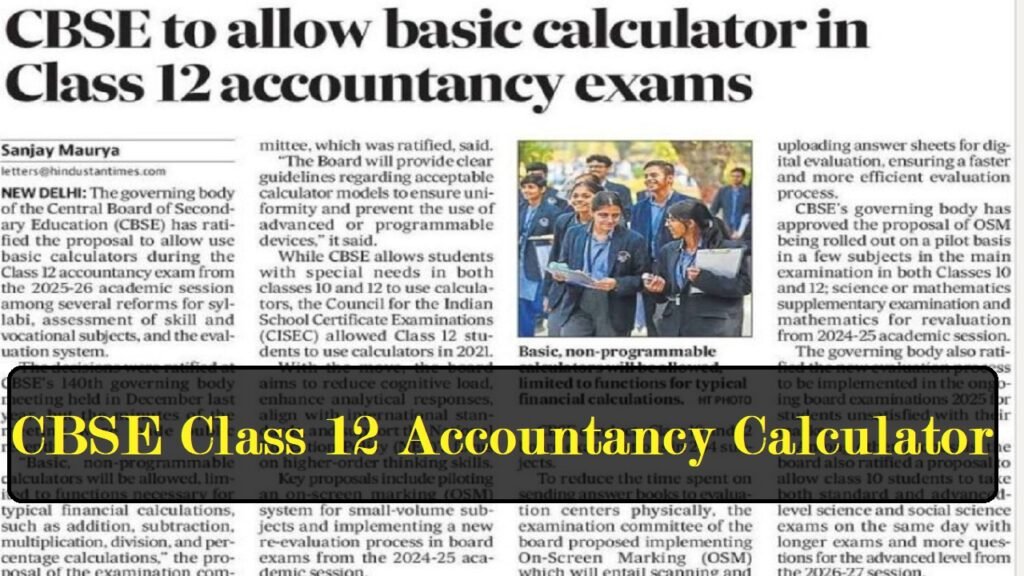CBSE Class 12 Accountancy Calculator: CBSE Introduces Basic Calculator Usage for Class 12 Accountancy Exam from 2025-26
Summary :- (CBSE Class 12 Accountancy Calculator) CBSE’s decision to allow basic calculators in Class 12 accountancy exams marks a major shift in its examination policy, aiming to ease cognitive load and improve analytical skills among students. Alongside this reform, the board has also introduced digital evaluation through On-Screen Marking, a new re-evaluation system, an advanced-level examination format for Class 10, and an updated curriculum for vocational education. These changes are expected to modernize CBSE’s assessment methods and make exams more student-friendly.
CBSE Class 12 Accountancy Calculator Overview
In a landmark decision set to ease students’ academic burden, the Central Board of Secondary Education (CBSE) has approved the use of basic, non-programmable calculators during the Class 12 accountancy exam starting from the 2025-26 academic session. This decision was ratified during CBSE’s 140th governing body meeting in December 2024, but the official minutes were made public recently. The move is part of a broader series of educational reforms aimed at improving syllabi, skill assessment, vocational education, and the evaluation system.

Table of Contents
The use of calculators in accountancy will help students focus on understanding financial concepts rather than spending time on lengthy calculations. However, to ensure uniformity and maintain academic integrity, CBSE has specified that only basic models with functions such as addition, subtraction, multiplication, division, and percentage calculations will be permitted. The board will also release guidelines on acceptable calculator models, preventing students from using advanced or programmable devices.
This reform aligns CBSE’s examination policies with global best practices, where many international education boards already permit calculators in specific subjects. Moreover, it aligns with the National Education Policy (NEP) 2020’s goal of reducing rote memorization and promoting higher-order thinking skills. By integrating technology responsibly into exams, CBSE is taking a step toward modernizing its assessment process while ensuring fairness and accessibility for all students.
Other Key Reforms Announced
In addition to allowing calculators in accountancy, CBSE has approved several other significant changes to enhance the board examination process:
- On-Screen Marking (OSM) System: CBSE will implement digital evaluation to reduce the time spent on transporting answer books to evaluation centers. Answer sheets will be scanned and uploaded for digital assessment, ensuring a faster and more efficient marking process. This system will be rolled out on a pilot basis in select subjects for Classes 10 and 12, supplementary exams in science and mathematics, and revaluation in mathematics from the 2024-25 academic session.
- Revised Re-evaluation Process: A new process for mark re-evaluation will be introduced from the 2024-25 academic session, giving students a more structured and transparent way to request re-checks if they are dissatisfied with their marks.
- New Examination Format for Class 10: From the 2026-27 session, Class 10 students will be allowed to take both standard and advanced-level science and social science exams on the same day. The advanced-level exams will have a longer duration and more in-depth questions, catering to students seeking a greater academic challenge.
- Curriculum Rationalization for Vocational Subjects: To align skill-based subjects with industry standards, CBSE plans to revise the curriculum for vocational education. An external independent agency with expertise in vocational education will be responsible for assessing these subjects, ensuring that students receive practical knowledge and skills relevant to their future careers.
Conclusion
CBSE’s latest reforms reflect its commitment to enhancing the quality of education by adopting modern assessment techniques and aligning with global standards. The introduction of calculators in the Class 12 accountancy exam, the shift toward digital evaluation, and flexible examination patterns indicate a progressive approach to education. These initiatives will not only reduce academic stress but also equip students with critical thinking and problem-solving skills essential for their academic and professional journeys. As CBSE continues to innovate its examination system, students can look forward to a more efficient, transparent, and inclusive evaluation process in the coming years.
Please note that the information provided in this article is primarily sourced from the internet. While every effort has been made to ensure its accuracy, we cannot guarantee the absolute correctness of the details. For comprehensive and definitive information, we strongly recommend visiting the official website for the most up-to-date and reliable details.


